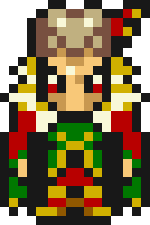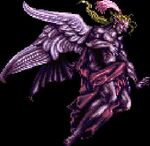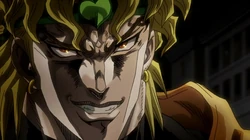| DIO has declared that this article has stopped in time, and any or all information on it may be outdated. Help improve this article by checking and updating its info wherever necessary And now time resumes! |
|
| “ | Why create, when it will only be destroyed? Why cling to life, knowing that you have to die? | „ |
| ~ Kefka Palazzo |
| “ | Read my lips - mercy is for wimps! There's a reason "oppose" rhymes with "dispose"... If they get in your way, kill them! | „ |
| ~ Kefka Palazzo |
| “ | Life... Dreams... Hope... Where do they come from? And where do they go? None of that junk is enough to fulfill your hearts! Destruction... Destruction is what makes life worth living! Destroy! Destroy! Destroy! Let's destroy everything! | „ |
| ~ Kefka Palazzo's famous monologue. |
Kefka Palazzo (spelled as Cefca Palazzo in the Japanese version), also known as Lord Kefka and Master Kefka, is the main antagonist of Final Fantasy VI. He is the former court mage of Emperor Gestahl of the Gestahlian Empire who plots to become the God of Magic and destroy all life and meaning in the universe. He is also the leader of his namesake secret society known as the Cult of Kefka.
Biography
Final Fantasy Appearances
Final Fantasy VI
?
Final Fantasy XIV
?
Dissidia Series
In Final Fantasy: Dissidia, Kefka shows huge interest in the powers of the character Terra, claiming that she wields the power capable of destroying the world. On several occasions in the game, he tries to turn Terra over to Chaos' side, claiming that she would only hurt more people if she continued to lose control of her powers. In Shade Impulse, a more tragic side of him is briefly shown, where he gives a similar nihilistic rant to his final boss battle in FFVI, only in a more sorrowful tone before self destructing with a saddened laugh, implying that he destroys simply because it is the only thing that actually gives him any sense of joy, as he no longer can understand love and hope due to losing his sanity.
In Dissida 012 Final Fantasy, Kefka returns as a Warrior of Chaos. In this game, his main plan is to sabotage the other team members plans so he can betray Chaos. He reveal's Kuja's betrayal to the other members and sets up his duel with Lightning, manipulates Sephiroth so he can battle Terra. He also uses Terra to serve him until Kuja removes his controlling spell. Kefka reappears in the final battle, attacking Vaan.
In Dissida Final Fantasy NT, he also appears as a playable character.
In Dissidia Final Fantasy Opera Omnia, Kefka again appears as a boss and a playable character, being able to be befriended in the event To Wane a Broken Heart.
Final Fantasy Tactics S
?
Final Fantasy Dimensions II
?
Theatrhythm Series
?
Pictlogica Final Fantasy
?
Final Fantasy Airborne Brigade
?
Final Fantasy Artniks
?
Final Fantasy All the Bravest
?
Final Fantasy Record Keeper
?
Final Fantasy Brave Exvius
?
Final Fantasy Trading Card Game
?
Non Final Fantasy Appearances
Fortune Street
?
Lord of Vermilion
?
Puzzle & Dragons
?
Monster Strike
?
Kingdom Hearts Union χ
Kefka lends his appearance to a limited time Heartless boss called the "Mysterious Sir" during the Final Fantasy Record Keeper collaboration event.
Personality

Kefka's sprite in the Final Fantasy VI.
While previous villains in the Final Fantasy series were distant, ferocious, nasty, cold, arrogant, ceremonious, and ruthless, as they bent on their goals, Kefka is aggressive, pompous, greedy, loud, cruel, short-tempered, maniacal and destructive. He is possessed of a deep nihilistic hatred of nearly everything in the world, and indeed, life itself. He also possesses an infamous and sadistic sense of humor, finding joy in the deaths of innocents. It is strongly implied in the game itself that his personality stemmed from the botched procedure that made him the first Magitek Knight, and thus allowed him to practice magic in the first place. As a result, Kefka's popularity as a Final Fantasy villain outside of Japan is only matched by Sephiroth. Kefka is well-known for his many one-liners, his final appearance as an Angel of Death (which has become something of a tradition in the series), and his sociopathic hatred of virtually everything in existence. His dark humor and jester-like appearance have earned him the nickname "the Psycho Clown" among fans. Kefka's most defining character trait is debatably his laugh, a trademark high-pitched cackle that is repeated numerous times throughout the game. Supplementary materials, the Japanese versions of the game and Dissidia also imply that he is calculating, narcissistic, temperamental, and manipulative, so he is largely a manchild.
The Fights With Kefka
Kefka is rather unique in the fact he is faced several times in the game and starts off as incredibly weak and even cowardly - yet as his madness grows (along with his influence) he gains ever more power and his battles become more intense - leading up to the final confrontation itself.

Kefka, the God of Magic.
The final battle with Kefka is arguably one of the more memorable moments in Final Fantasy, unlike many final bosses in the series, Kefka was not able to be defeated alone - players were required to fight their way to the top of a tier that was inspired by the Divine Comedy and had Kefka's imagery warped with religious icons (censored in some versions of the game), showcasing his nihilism and madness as the player fights through symbolic representations of Hell, Purgatory and Heaven before finally ascending to the very top of the tier where they are greeted to the final confrontation: a godlike Kefka, who then proceeds to taunt the heroes by stating that life is meaningless - the heroes then engage the new god of magic to finally end his reign of terror.
Quotes
| “ | Hee, hee! Nothing can beat the sweet music of hundreds of voices screaming in unison! | „ |
| ~ Kefka, about to poison Doma's river. |
| “ | I'm a god! I'm all-powerful! Uwee-hee-hee... I'll collect more espers! I'll extract their magic... And then... ... ... I'll revive the Warring Triad! | „ |
| ~ Kefka in the Magitek Factory. |
| “ | And time will destroy all of those as well. Why do people insist on creating things that will inevitably be destroyed? Why do people cling to life, knowing that they must someday die? ...Knowing that none of it will have meant anything once they do? | „ |
| ~ Kefka upon the Returners confronting him at his tower, regarding both life and existence. |
| “ | Grr...! Don't think you've won! | „ |
| ~ Kefka. |
| “ | Hee-hee-hee! But what's the fun in destruction when there are no 'precious' lives lost? | „ |
| ~ Kefka |
Trivia
- In the Japanese version of Dissidia, Kefka was voiced by Shigeru Chiba, who also voiced Buggy of One Piece, Discord from My Little Pony, and Emperor Pilaf and Raditz of the Dragon Ball series.
- Coincidentally, Kefka's arch-nemesis, Terra Branford's field sprite bore a resemblance to Bulma from the Dragon Ball series, whom Pilaf also antagonized, and he also briefly tormented Terra in Dissidia with a dark truth about her during their first onscreen meeting, similar to Raditz and Goku's first meeting in the DBZ series. Both also had them taking a childlike character with them, although for differing reasons (Raditz abducted Gohan, Goku's son, in an attempt to force Goku to give in to his Saiyan nature and kill many people; Kefka unintentionally took Onion Knight along when he fought the latter when the latter angrily attacked the former for his tormenting Terra).
- Kefka himself is a villainous clown like Buggy and is also a leader of his own group.
- In addition, similar to Discord, Kefka tried to make the world into a mess, the only difference being that Discord simply did it out of a delusional belief that he was helping the world while Kefka did it for fun and due to nihilism.
- Ironically, at one point during his battle with Terra in Dissidia, Kefka flies into the screen at high speed with an immensely maniacal facial expression in a similar manner to Yazoo, one of the Remnants of Sephiroth, in Final Fantasy VII: Advent Children. Kefka's English voice actor, Dave Wittenberg, had previously voiced Yazoo.
- In Final Fantasy: Dissidia, Kefka breaks the fourth wall by humming the Final Fantasy Fanfare after winning a fight.
- Kefka is one of the few characters in the Final Fantasy series to use the attack "Heartless Angel".
- Kefka's final theme is "Dancing Mad" and is one of the longest Final Fantasy themes - starting off as an almost hymn-like tune complete with pipe-organs then breaking into an apocalyptic battle-tune: it is considered by many as one of the most popular Final Fantasy themes (rivaled by "One Winged Angel").
- Kefka's laugh appears in Square's "Chrono Trigger" when the player talks to Nolstein Bekkler in the Millenial Fair. Ozzie also has Kefka's laugh. It is also used in the fangame based off of the Creepypasta character Sonic.EXE.
- His God of Magic form bears some resemblance to the fallen archangel Lucifer of Abrahamic beliefs who is sometimes depicted as another name for Satan/The Devil.
- It is to be noted that his characterization differed between the Japanese and overseas releases of Final Fantasy VI. In the former, his childish aspects were more emphasized, while the latter gave him a far darker tone of characterization, where it has made explicit that he was fully aware of the pain and misery he was causing people with his actions and outright enjoying it, as well as far more outrageous and hateful, yet still written in a humorous manner. Future re-releases such as the GBA, iOS, and PC versions combined both aspects in the Japanese releases.
Template:Final Fantasy VI Villains

